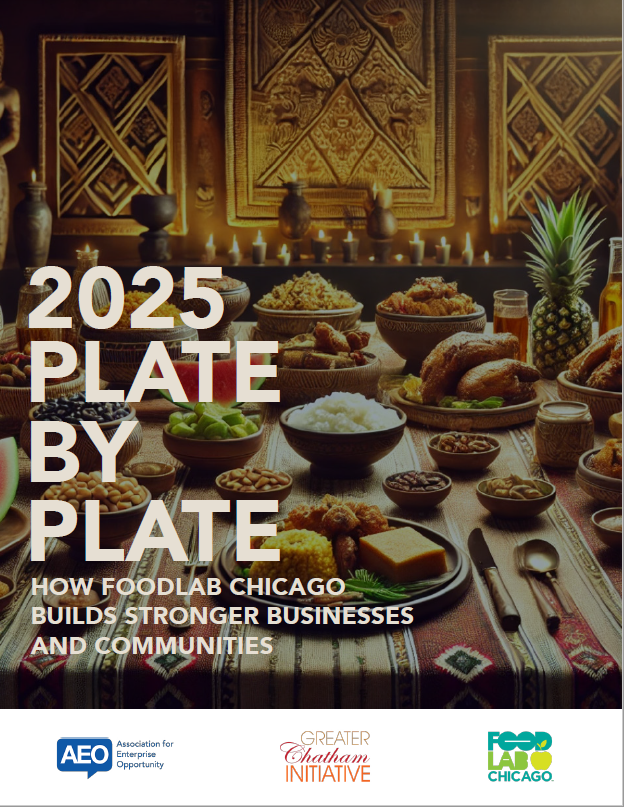
Discover how FoodLab Chicago is helping food entrepreneurs turn strong businesses into stronger neighborhoods. This impact report captures five years of growth, innovation, and community transformation across Greater Chatham—and offers a blueprint for cities nationwide working toward equitable growth.
View publication
Click for more
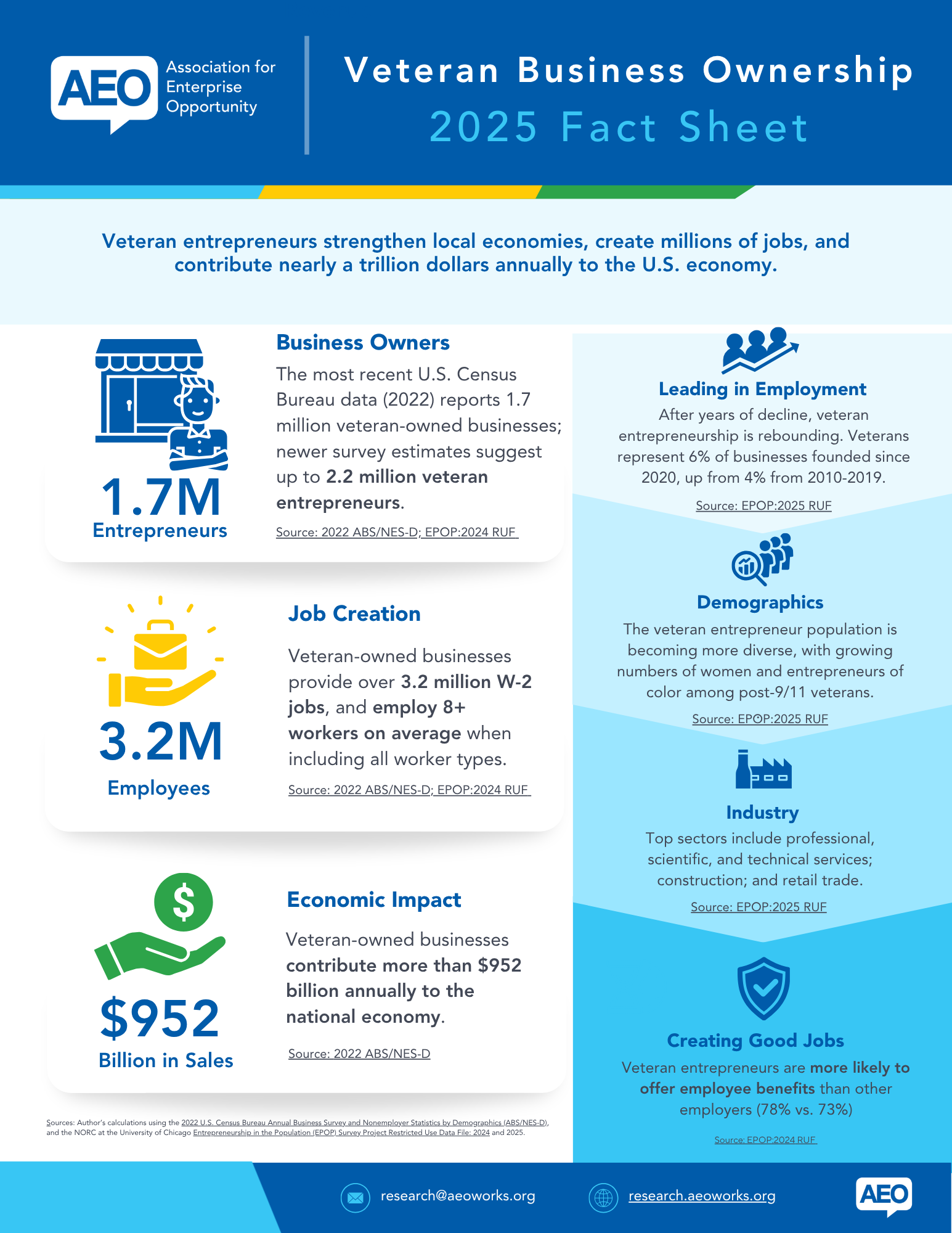
In celebration of National Veteran Small Business Week 2025, AEO has released a fact sheet highlighting the significant contributions of Veteran entrepreneurs to the U.S. economy and opportunities for support.
View publication
Click for more
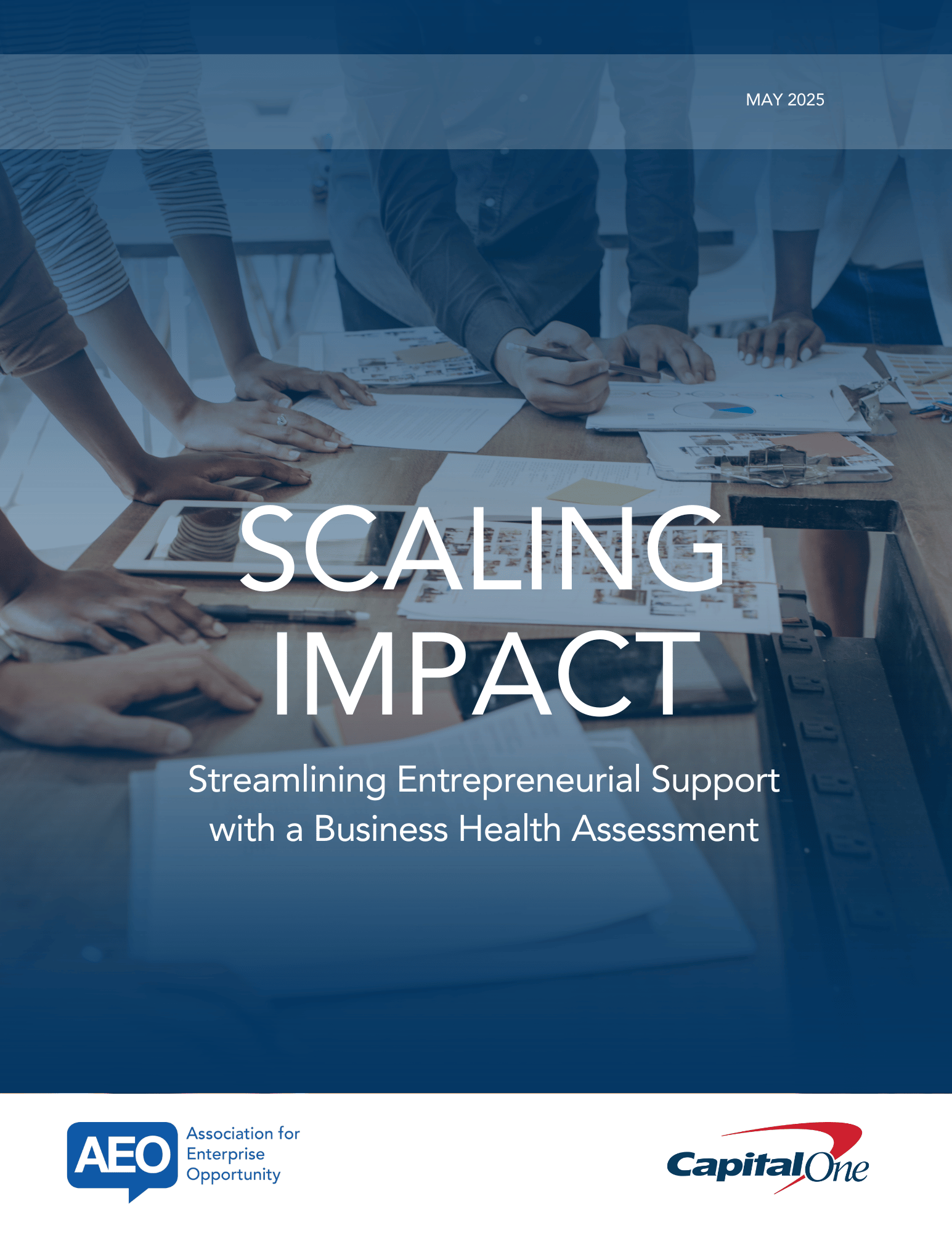
This brief shares findings from AEO’s BHA pilot, highlighting how diagnostic tools can improve coaching efficiency and strengthen support for small businesses.
View publication
Click for more
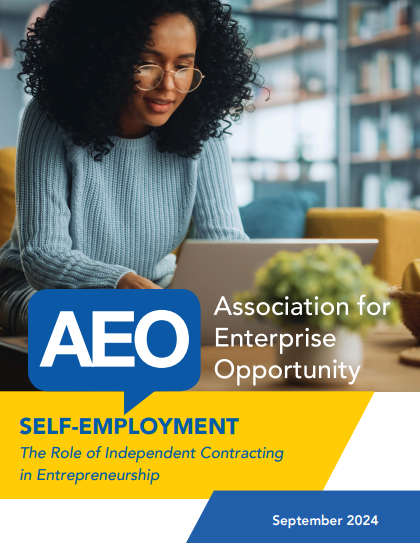
This report explores the roles of self-employment and independent contracting in the microbusiness economy, delves into why individuals become self-employed, the challenges and opportunities that shape their experiences, and identify how stakeholders can help these self-employed entrepreneurs thrive.
View publication
Click for more
Search our publications by keywords or categories
Click on any of the publications below to expand and download

Discover how FoodLab Chicago is helping food entrepreneurs turn strong businesses into stronger neighborhoods. This impact report captures five years of growth, innovation, and community transformation across Greater Chatham—and offers a blueprint for cities nationwide working toward equitable growth.
View publication
Click for more

In celebration of National Veteran Small Business Week 2025, AEO has released a fact sheet highlighting the significant contributions of Veteran entrepreneurs to the U.S. economy and opportunities for support.
View publication
Click for more
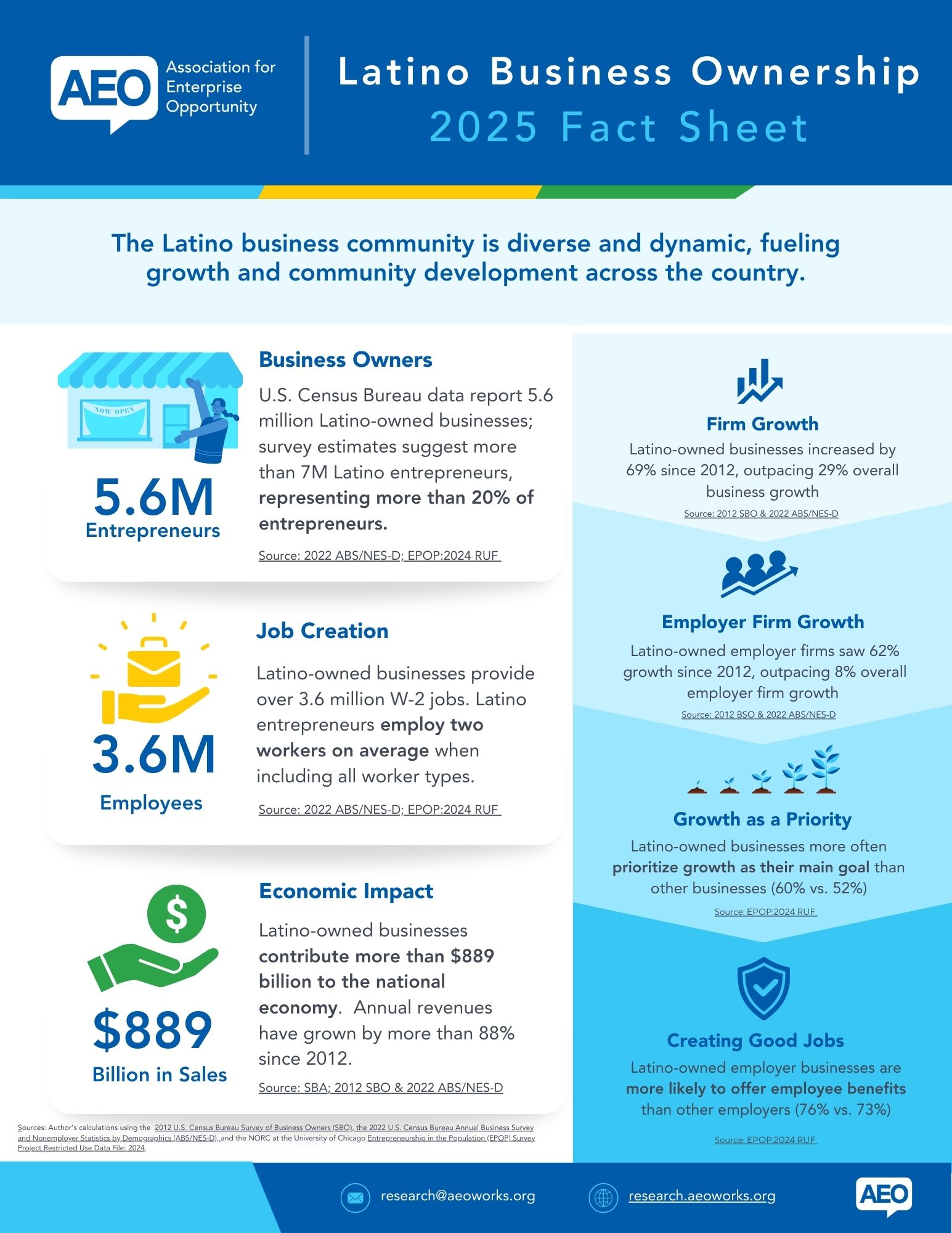
In celebration of Hispanic Heritage Month 2025, the Association for Enterprise Opportunity (AEO) has published a fact sheet highlighting the significant contributions of Latino entrepreneurs to the U.S. economy and opportunities for support.
View publication
Click for more
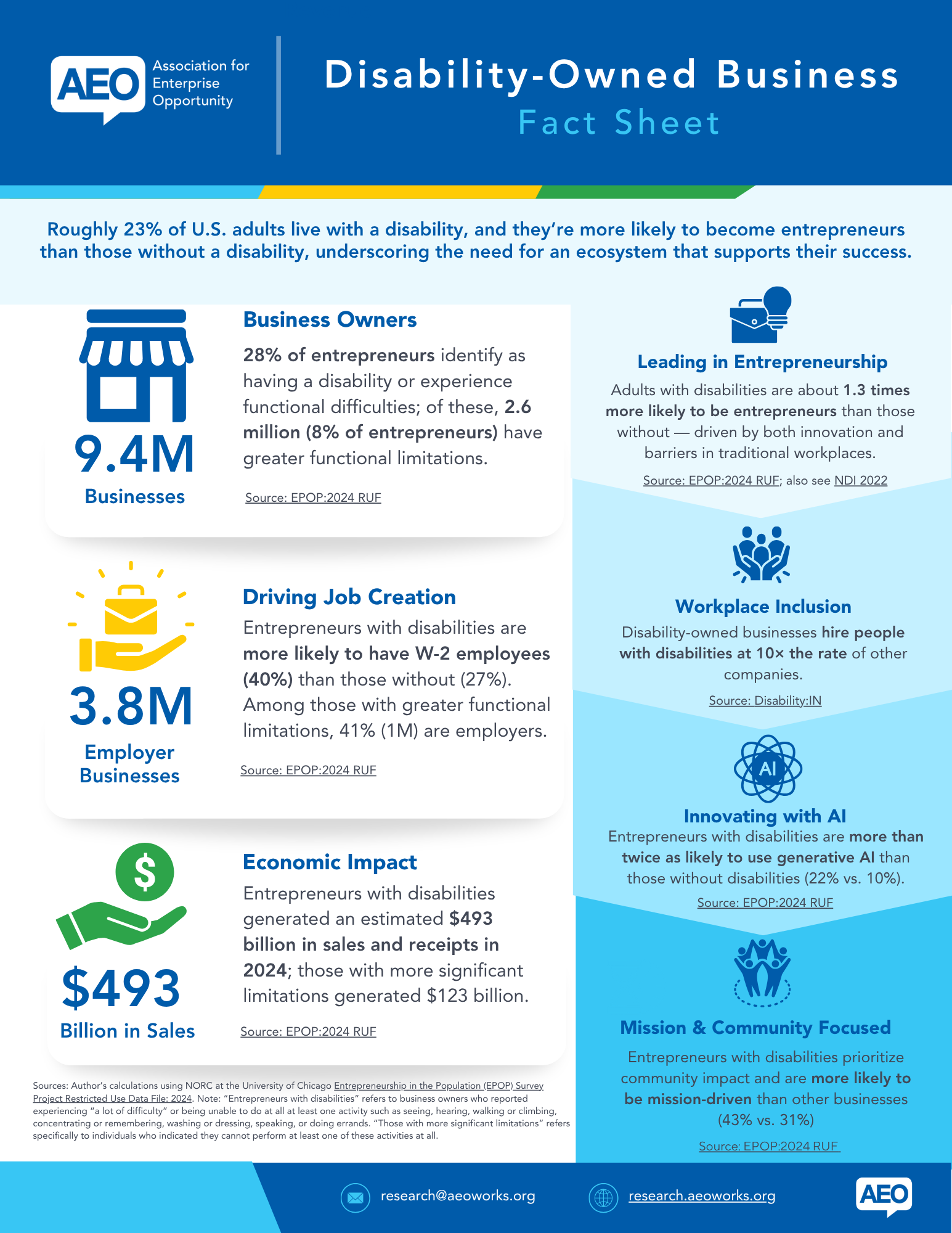
AEO’s latest fact sheet leverages a new, nationally representative survey of entrepreneurs to fill critical data gaps and underscores why we must build a truly inclusive small business ecosystem.
View publication
Click for more
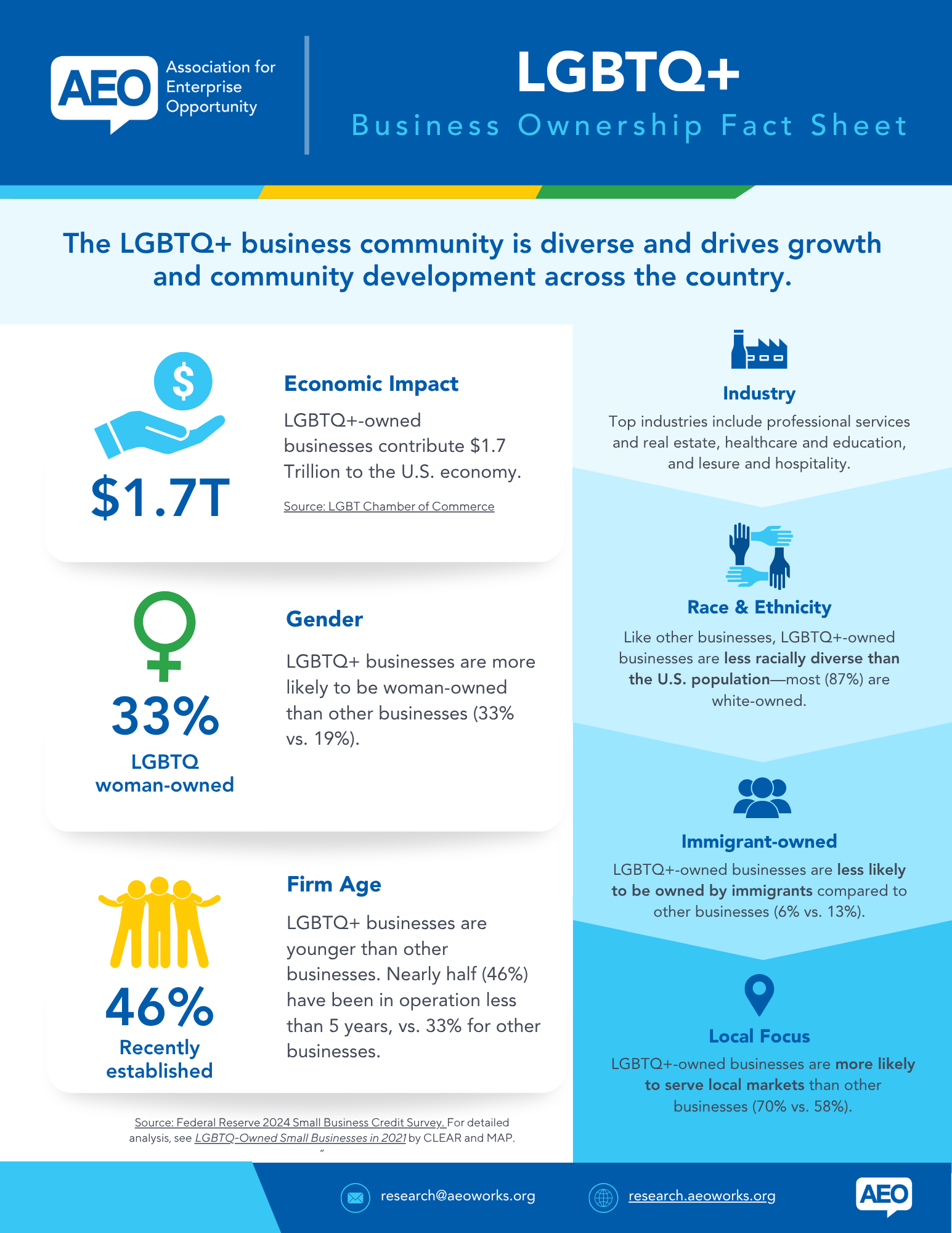
Explore key insights on LGBTQ+ entrepreneurs, including economic impact, barriers to growth, and opportunities for inclusive support.
View publication
Click for more
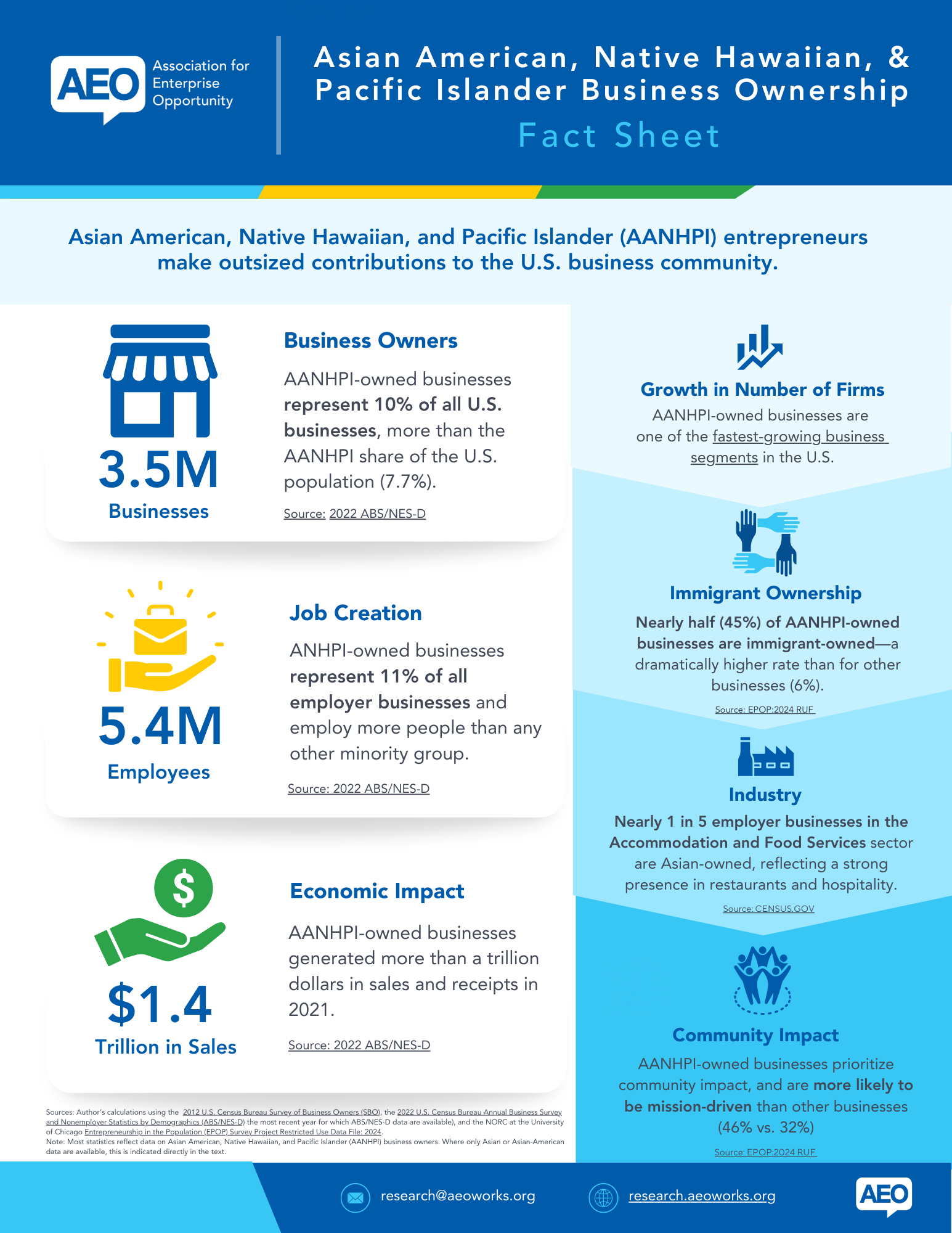
In honor of Asian American, Native Hawaiian, and Pacific Islander (AANHPI) Heritage Month this May, AEO celebrates the vital role that AANHPI entrepreneurs play in the U.S. business community with the release of its 2024 AANHPI Business Ownership Fact Sheet.
View publication
Click for more

This brief shares findings from AEO’s BHA pilot, highlighting how diagnostic tools can improve coaching efficiency and strengthen support for small businesses.
View publication
Click for more
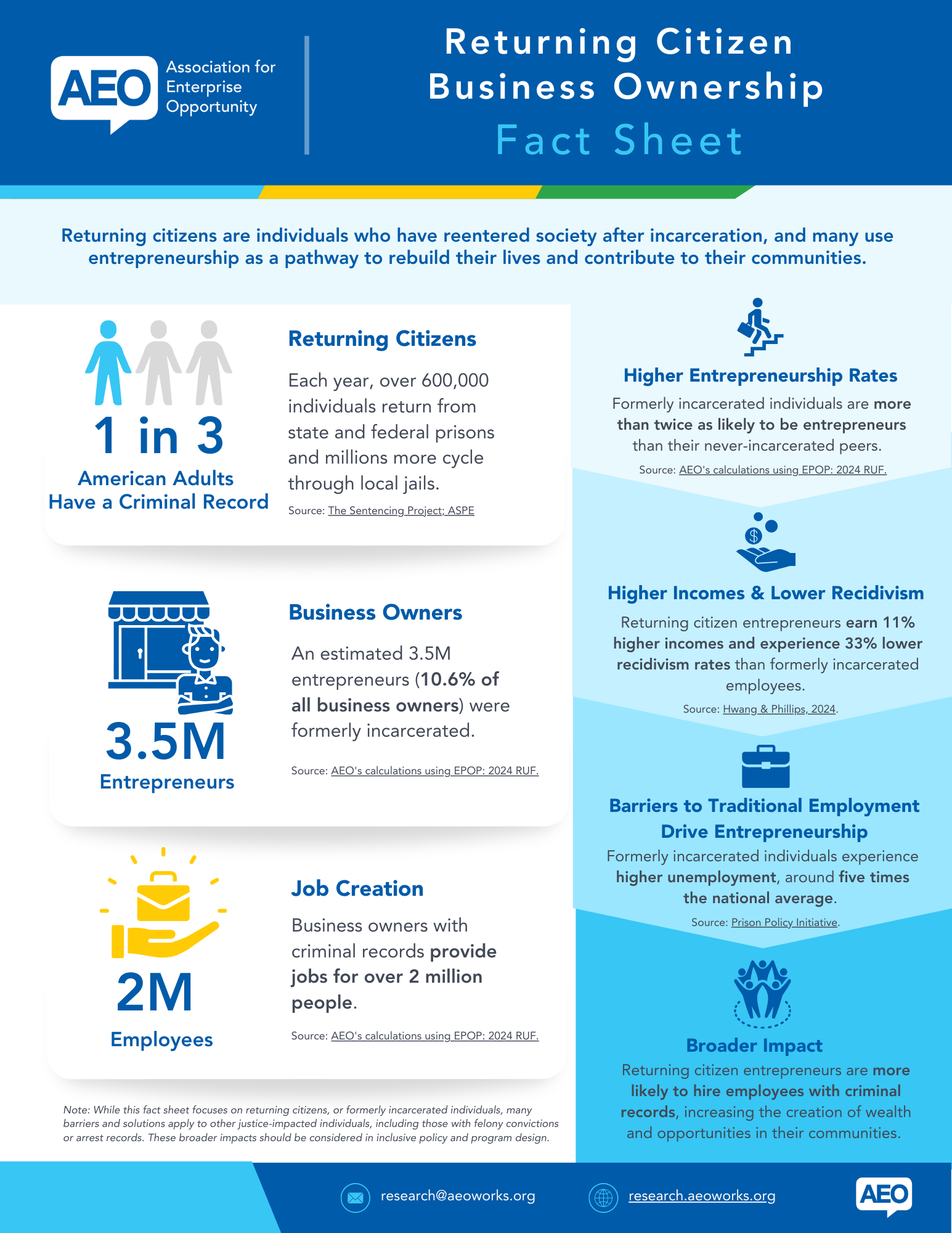
In recognition of Second Chance Month, the Association for Enterprise Opportunity has published a fact sheet highlighting the entrepreneurial resilience of returning citizens and the critical role business ownership plays in successful reentry. AEO underscores the importance of programming and advocacy to ensure that individuals impacted by the criminal legal system have a fair opportunity to thrive as entrepreneurs and community leaders.
View publication
Click for more
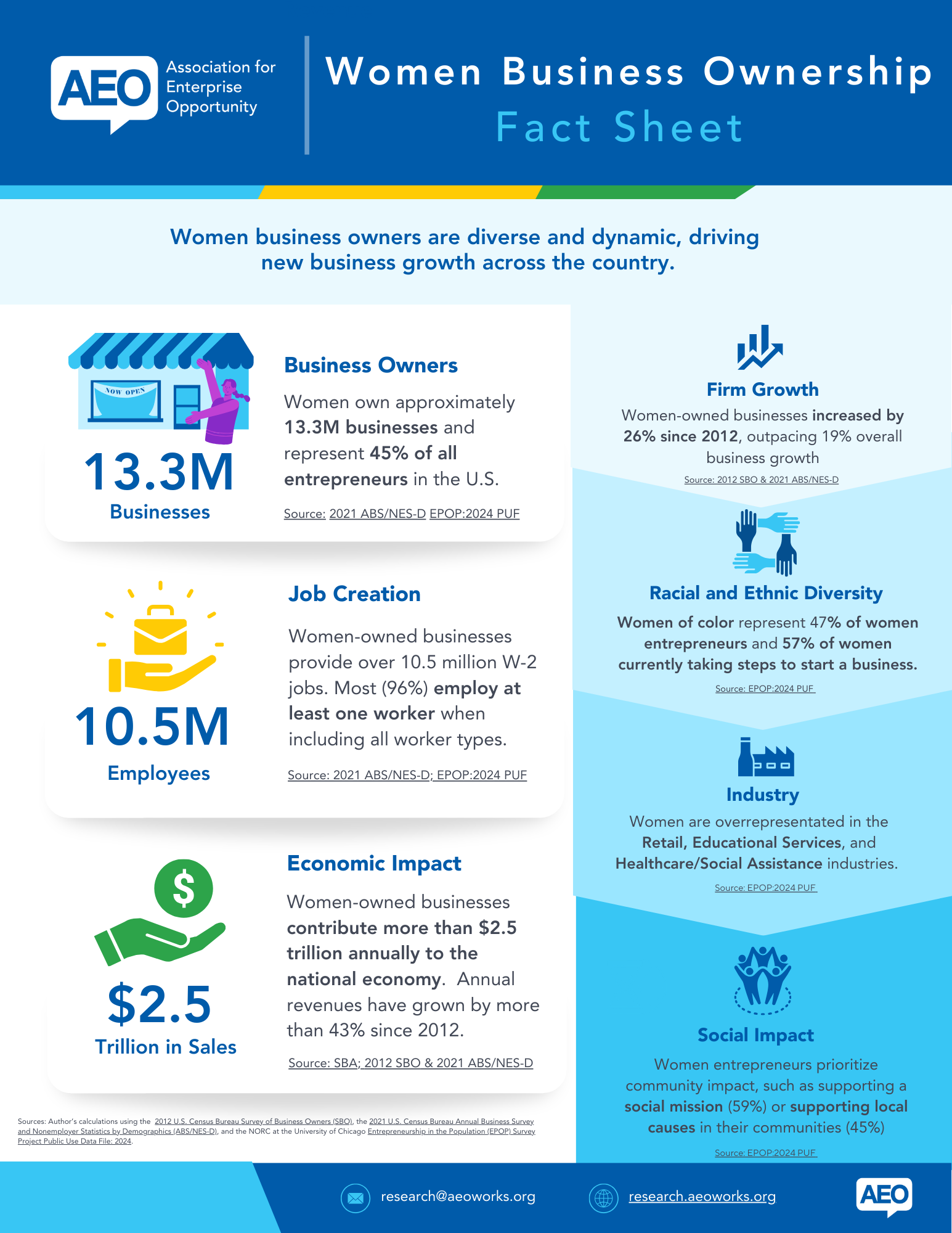
In celebration of Women's History Month, the Association for Enterprise Opportunity has published a fact sheet highlighting the significant contributions of women entrepreneurs and opportunities for support. AEO emphasizes the need for continued advocacy, inclusive policies, and business support programs to ensure an equitable environment for women-owned businesses.
View publication
Click for more

In celebration of Black History Month, the Association for Enterprise Opportunity (AEO) has published a fact sheet highlighting the significant contributions of Black entrepreneurs and opportunities for support.
View publication
Click for more
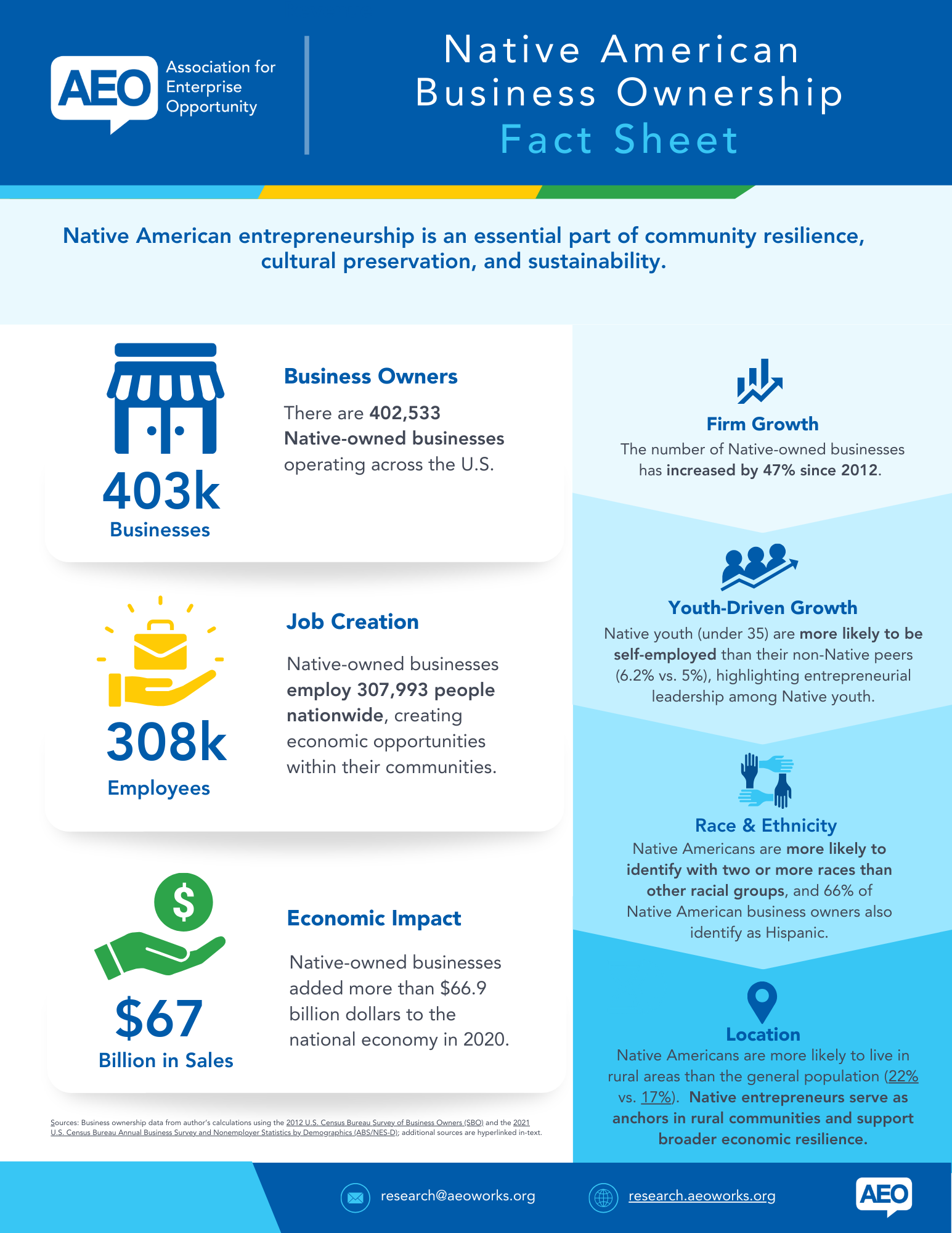
In celebration of Native American Month 2024, the Association for Enterprise Opportunity (AEO) has published a fact sheet highlighting the significant contributions of Native entrepreneurs and opportunities for support.
View publication
Click for more
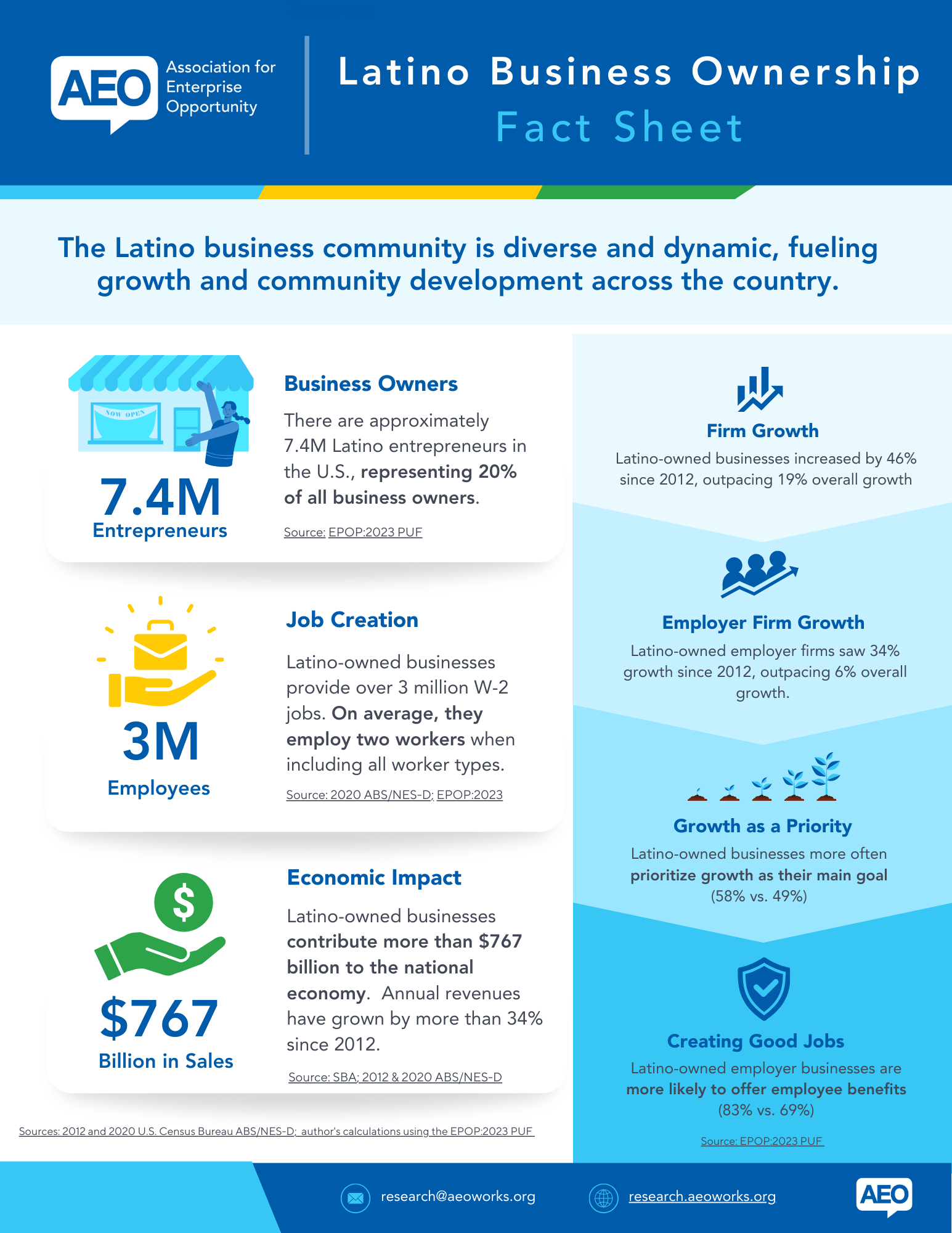
In celebration of Hispanic Heritage Month 2024, the Association for Enterprise Opportunity (AEO) has published a fact sheet highlighting the significant contributions of Latino entrepreneurs to the U.S. economy and opportunities for support.
View publication
Click for more
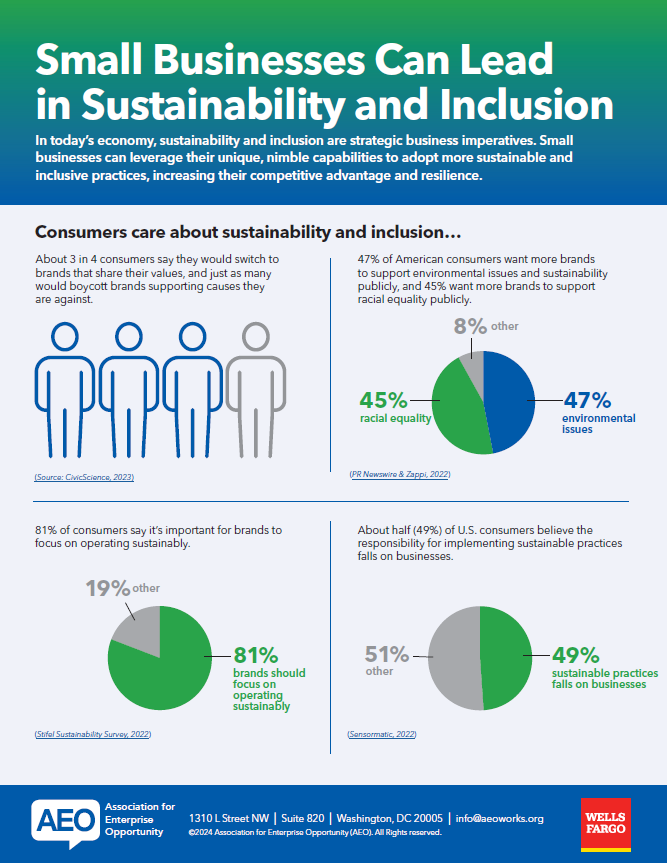
This handout is a supplemental resource to AEO's Seizing Opportunities report, published in July 2024.
View publication
Click for more

This report from AEO highlights the specific obstacles and needs of Black-owned small retail businesses and offers insights into how a more connected ecosystem can benefit all retailers.
View publication
Click for more
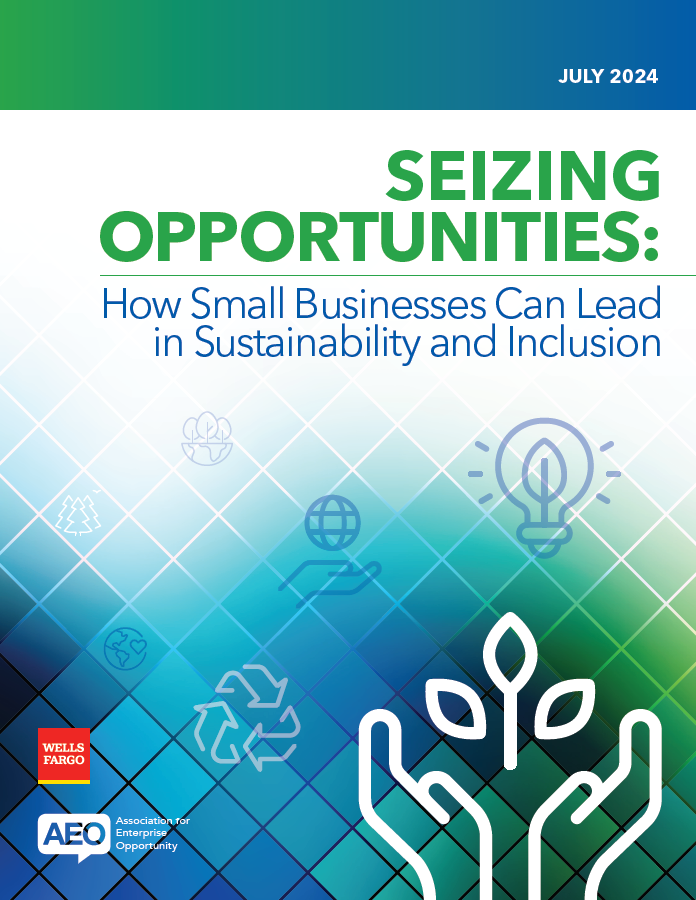
AEO's Seizing Opportunities report shed light on the challenges and opportunities faced by diverse-owned small businesses in adapting to the to the evolving landscape of corporate sustainability and inclusion strategies.
View publication
Click for more

In celebration of Pride Month 2024, the Association for Enterprise Opportunity (AEO) has published a fact sheet highlighting the significant contributions of LGBTQ+ entrepreneurs to the U.S. economy, amounting to over $1.7 trillion annually. LGBTQ+-owned businesses, ranging from innovative startups to successful local enterprises, play a crucial role in fostering economic growth and employment.
View publication
Click for more
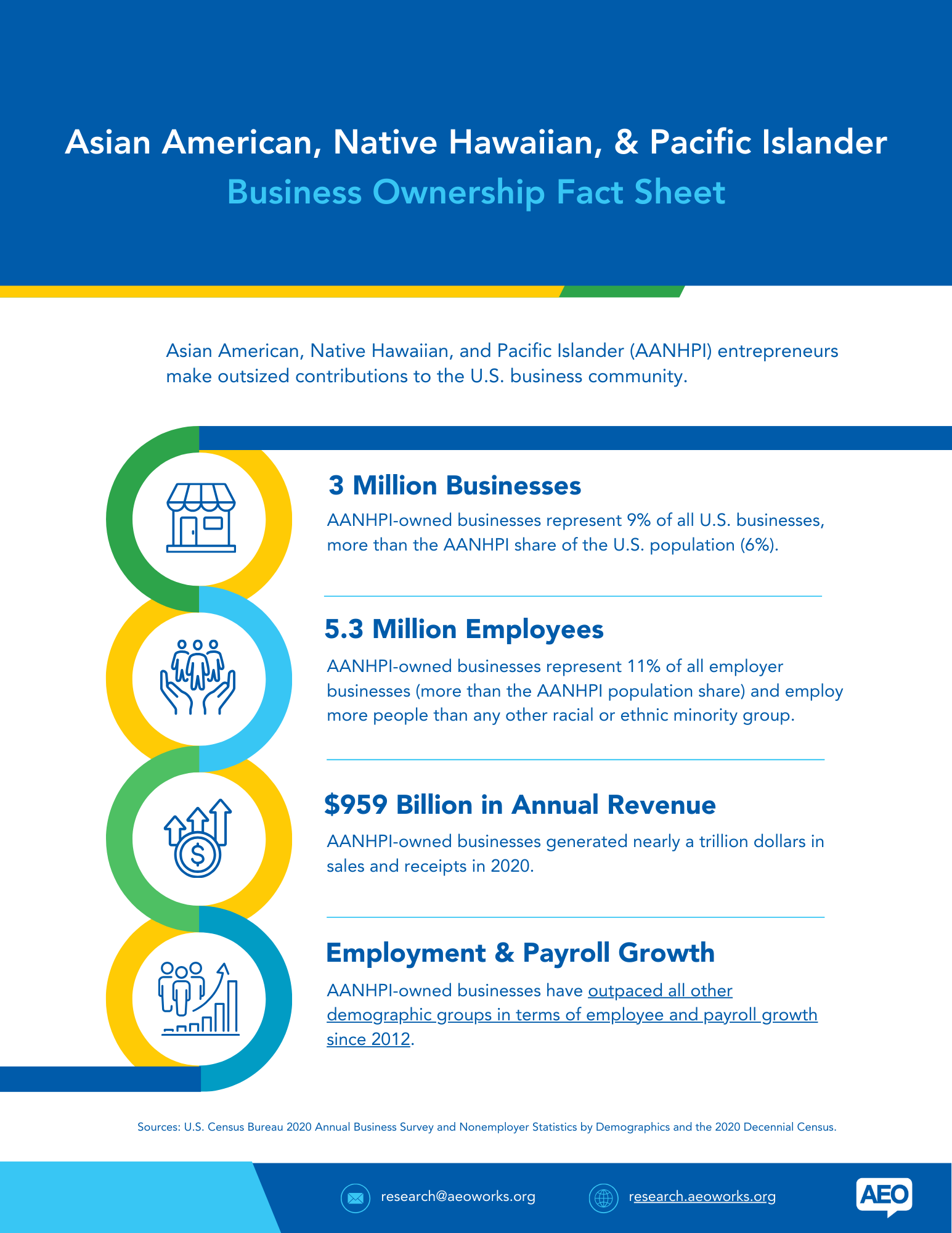
As the nation commemorates Asian American, Native Hawaiian, and Pacific Islander (AANHPI) Heritage Month this May, the Association for Enterprise Opportunity (AEO) celebrates the vital role that AANHPI entrepreneurs play in the U.S. business community with the release of its 2024 AANHPI Business Ownership Fact Sheet.
View publication
Click for more
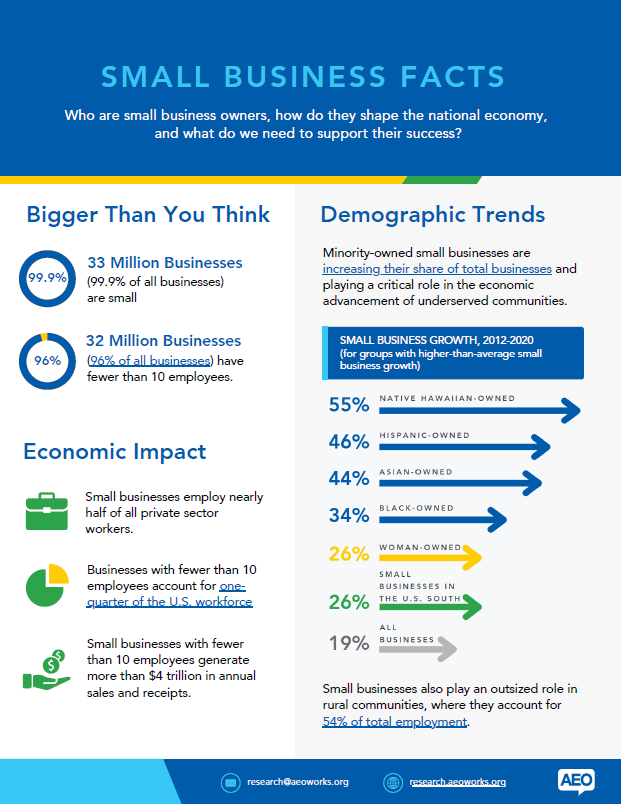
It’s National Small Business Week, and conversations about small business are getting increased attention. But who are small business owners, how do small businesses shape the U.S. economy, and what do we need to support their success?
View publication
Click for more
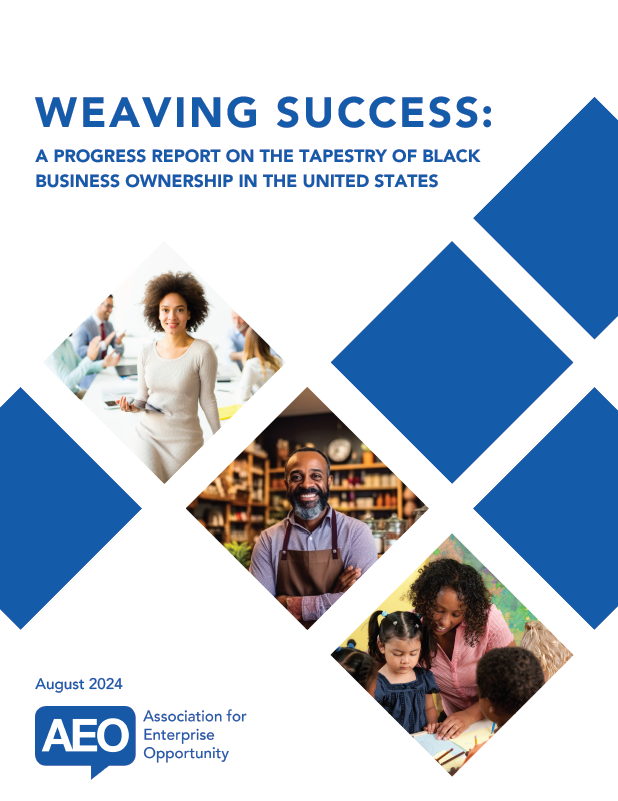
Black entrepreneurs are driving new business formation and closing a longstanding gap in business ownership, but structural barriers prevent many from reaching their full potential. This report leverages new data to arm ecosystem stakeholders – community lenders, business support organizations, and policymakers – with insights to support the success of Black entrepreneurs.
View publication
Click for more
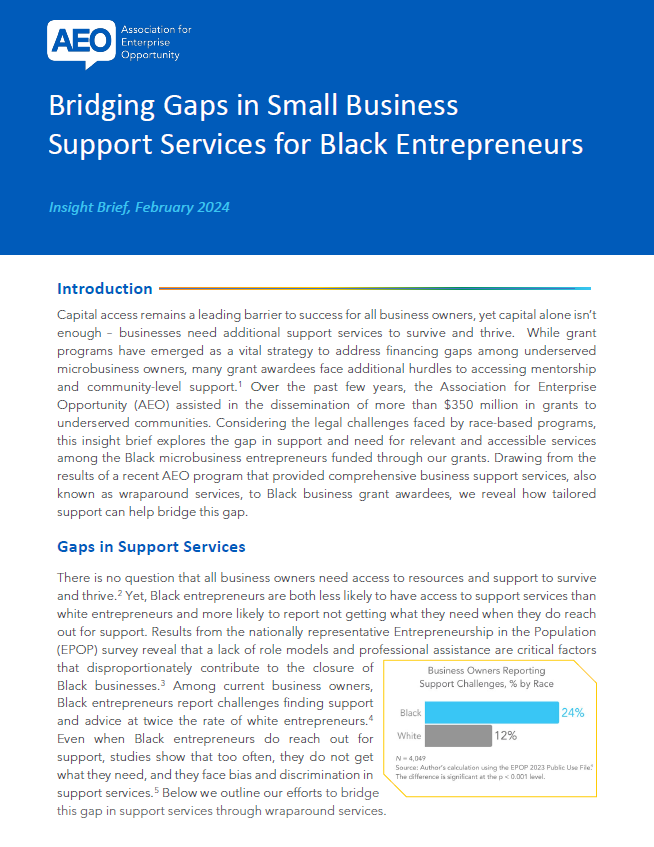
Capital access remains a leading barrier to success for all business owners. Yet, while grant programs have emerged as a vital strategy to address financing gaps among underserved microbusiness owners, many Black business owners face additional hurdles to accessing mentorship and community-level support. Considering the legal challenges faced by race-based programs and drawing from the results of a recent AEO grant program that provided comprehensive business support services, also known as wraparound services, to Black business grant awardees, we reveal how tailored support can help bridge this gap.
View publication
Click for more

This report explores the roles of self-employment and independent contracting in the microbusiness economy, delves into why individuals become self-employed, the challenges and opportunities that shape their experiences, and identify how stakeholders can help these self-employed entrepreneurs thrive.
View publication
Click for more
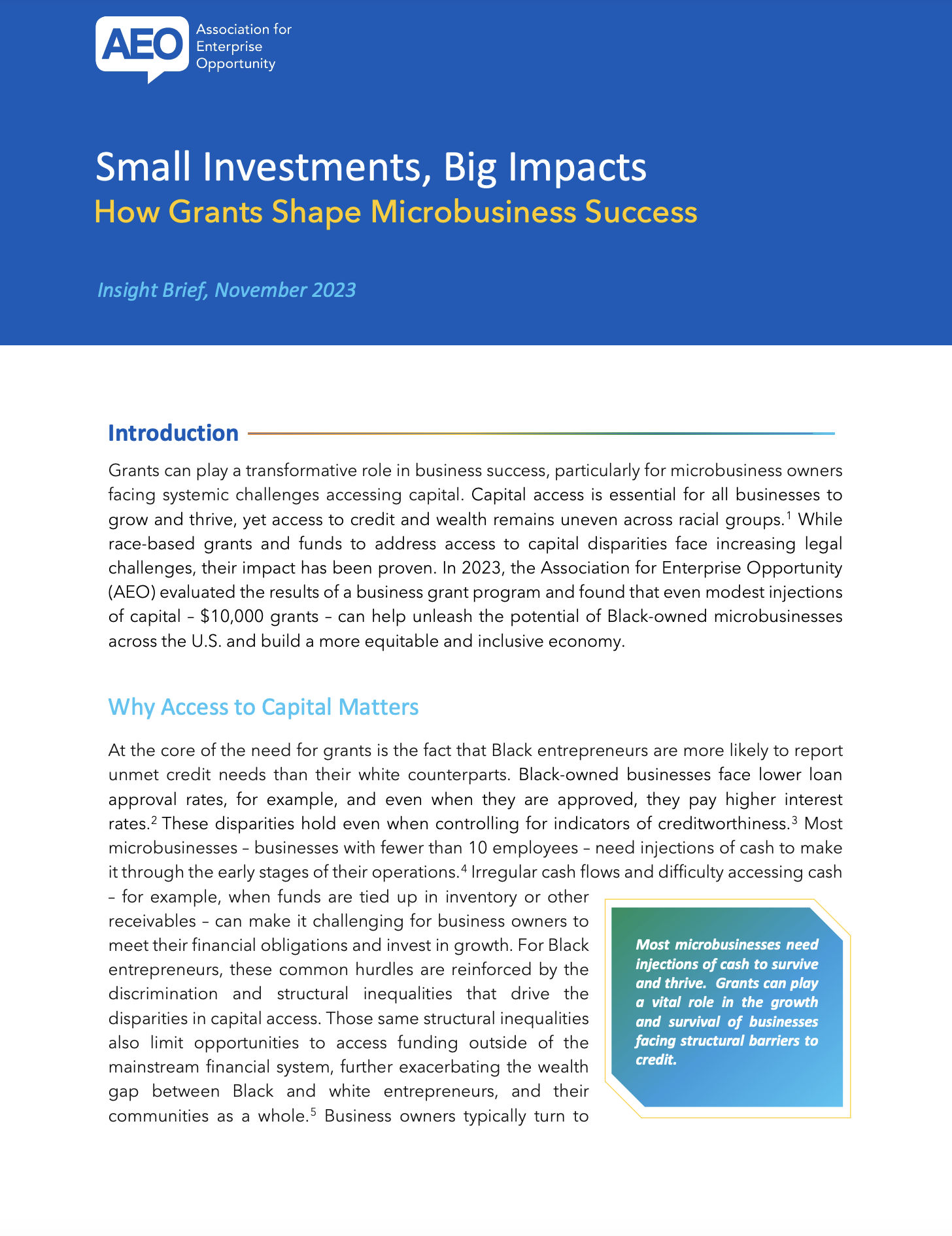
Grants can play a transformative role in business success, particularly for microbusiness owners facing systemic challenges accessing capital. Capital access is essential for all businesses to grow and thrive, yet access to credit and wealth remains uneven across racial groups.
View publication
Click for more
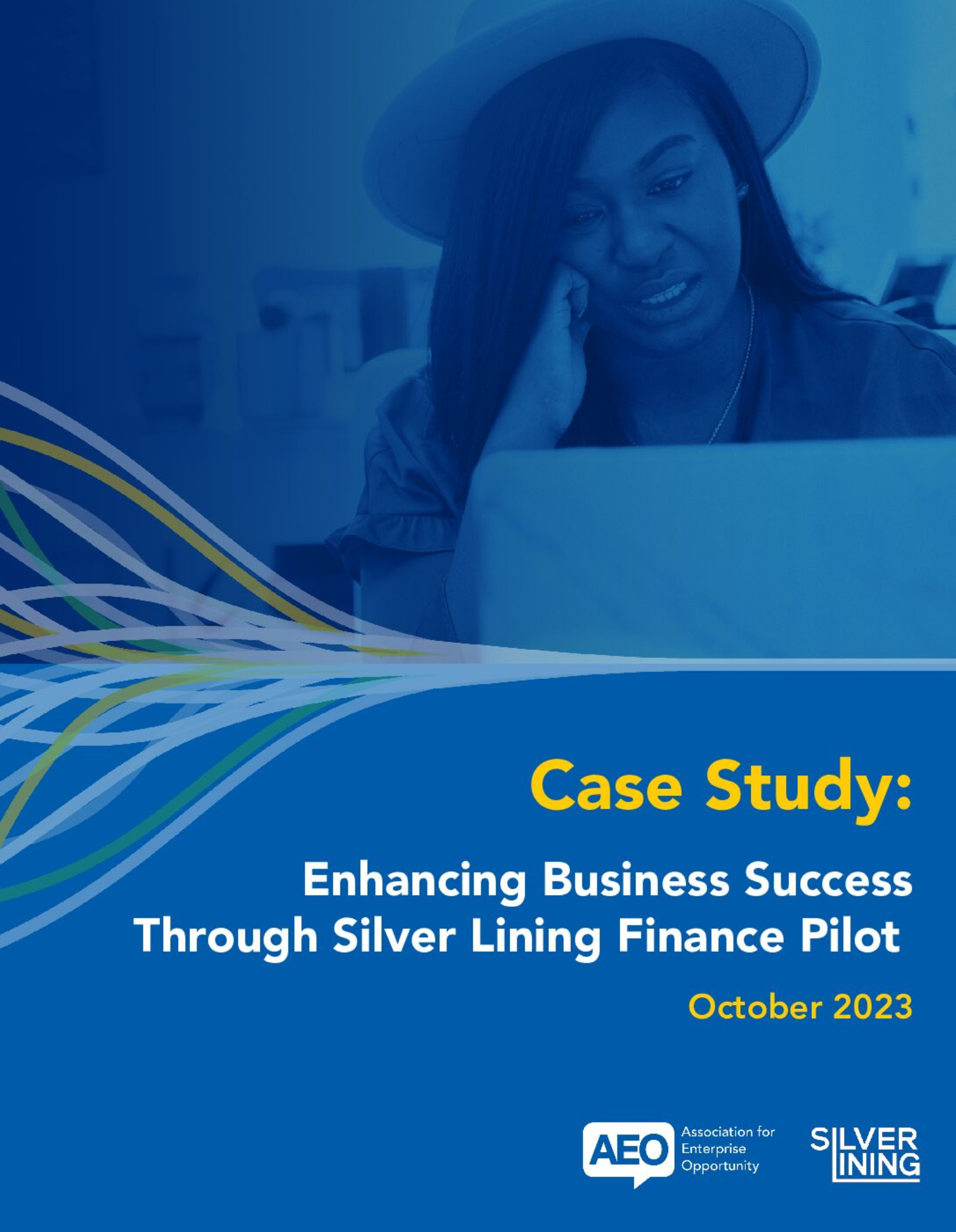
This case study highlights the transformative journey of the Association for Enterprise Opportunity (AEO)'s second iteration (Cohort 2) of its Silver Lining Action Plan (SLAP™), a 13-month initiative providing tech solutions to help Black female Small Business Owners build profitable and sustainable businesses.
View publication
Click for more
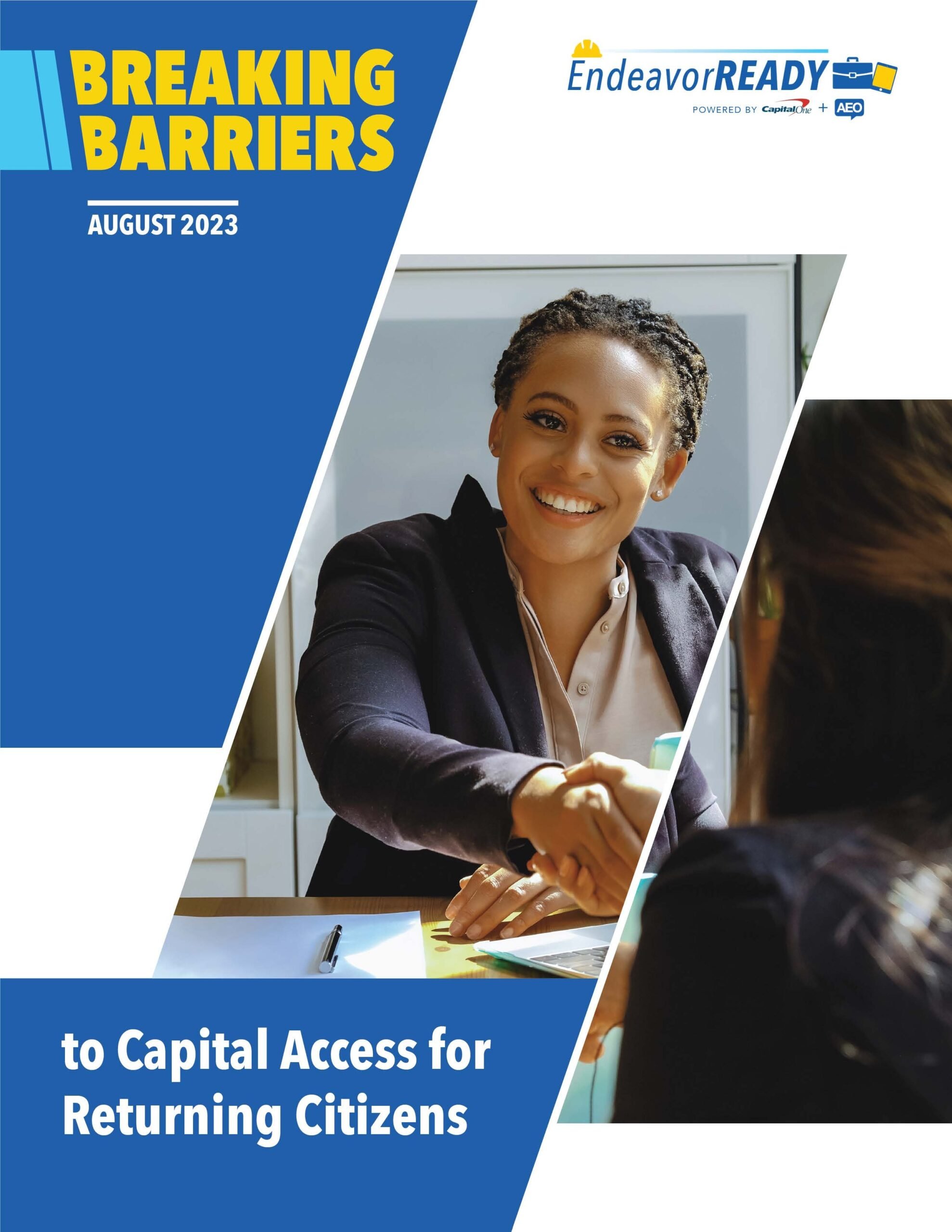
Endeavor Ready 3.0: Breaking Barriers to Capital Access for Returning Citizens report outlines actions that lenders and organizations in the reentry community can take to improve outcomes in their programs and remove barriers to capital access to better serve millions of returning citizens.
View publication
Click for more
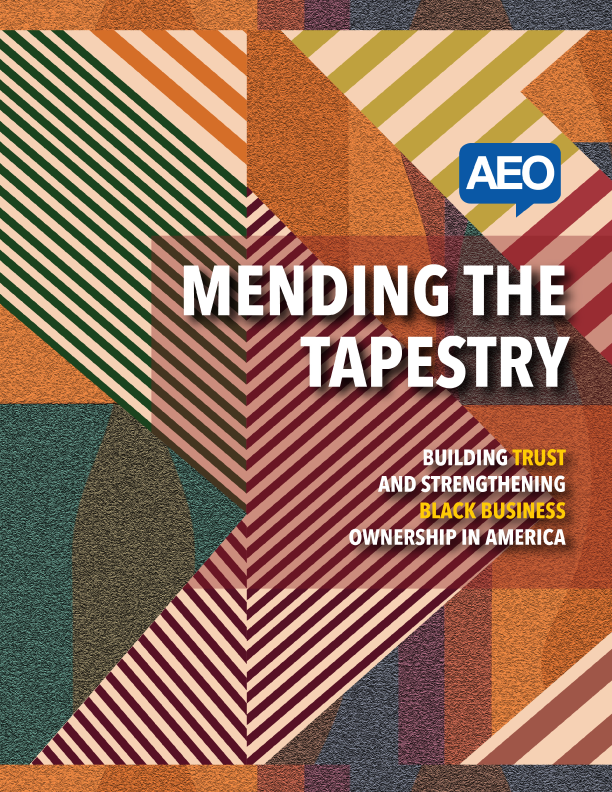
This report focuses on identifying strategies to address one of the key barriers to Black business success: the trust gap. The trust gap is a relationship breach between Black business owners and institutions in their business ecosystem and is a threat to individual, community, and societal well-being.
View publication
Click for more

This report presents the details of the program and offers a call-to-action and a set of strategies aimed at helping build an entrepreneurial ecosystem that can have a profound impact on communities — especially underserved communities — throughout the United States.
View publication
Click for more
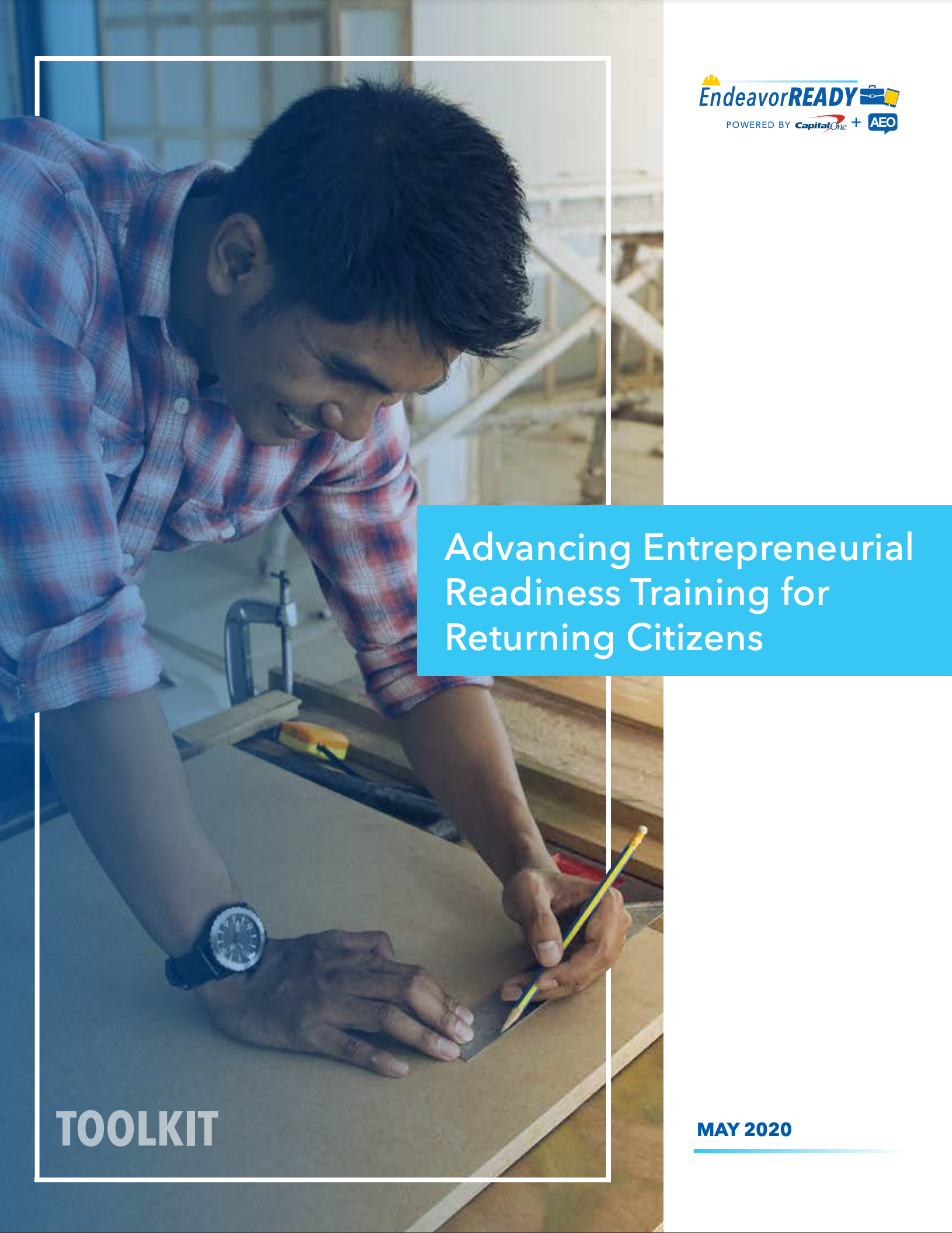
This toolkit provides easy-to-use resources for practitioners offering post-release entrepreneurial training to returning citizens (individuals who were formerly incarcerated). The opportunities highlighted are intended for program managers, funders, and policy makers seeking to learn more effective training approaches or for potential partners looking to improve support to returning citizen entrepreneurs.
View publication
Click for more

Entrepreneurship can effectively address the underlying causes of the high recidivism rate, while also providing a promising career and life path. However, the difference between success and failure for these fledgling entrepreneurs may lie in three key strategies: early credit development, right-fit capital, and trauma-informed care. When training programs add these strategies into their curriculum, they can deliver even greater success and impact for participants. This paper also shares experiences of how people are realizing their dreams of long-term career and life success, and how new programs are enabling them to do so.
View publication
Click for more
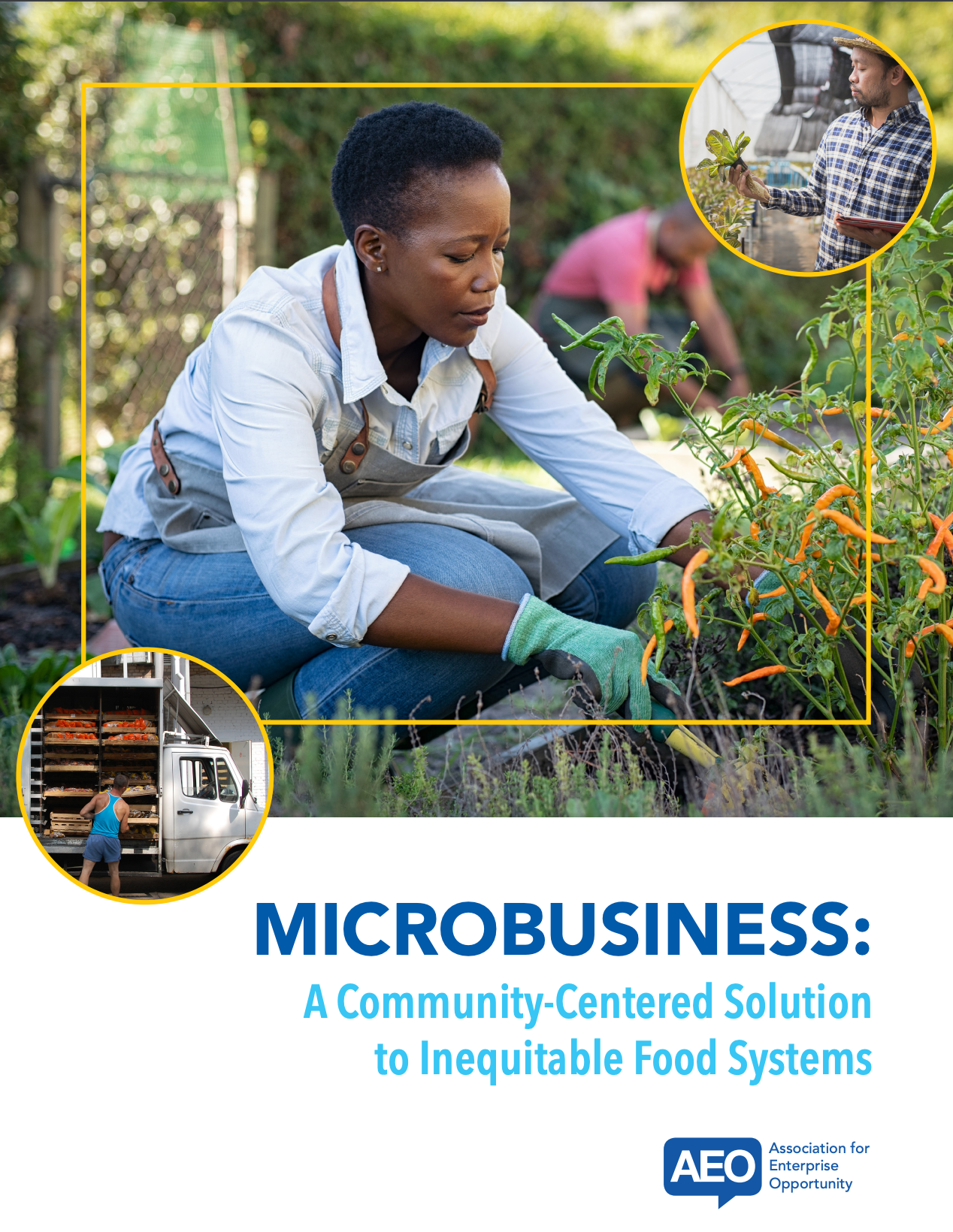
AEO’s research explores the possibility of local food system microbusiness to increase food access, food security, and economic opportunity while building community wealth. Defined as all the processes and actors involved in transforming a seed into food, food systems include farmers, distributors, food manufacturers, retailers, and consumers. By bridging economic development and financial security with locally owned food systems, local food system microbusiness empowers community members with the capacity to change their food systems while disrupting the effects of poverty.
View publication
Click for more

Black-owned businesses in America lag behind other firms in the United States and have done so for decades. There are fewer Black business owners than we might expect given the population size; businesses that do exist have fewer employees than nonminority firms; and revenues are much smaller for Black-owned firms, even when comparing the same industries. Some have suggested this reality stems from a cultural context that includes lack of interest in self-employment, but AEO’s research dispels this myth and confirms that the entrepreneurial spirit remains robust in the Black community. In fact, Black business owners are similar to other business owners in terms of vision, passion, and a desire for economic independence. In this report, we assert instead that the interplay of three major persistent barriers is impeding the establishment and growth of Black-owned firms. These are: the Wealth Gap, the Credit Gap, and the Trust Gap. This paper frames these obstacles, which must be considered and solved for in order to unleash the potential economic power of Black-owned businesses in the United States.
View publication

Click for more

In order to gain insight into what microbusinesses in low-wealth communities need to grow and hire, AEO assessed the needs of business owners, compared them to the current landscape of available support and proposed a new approach to fill the gap.
View publication
Click for more

AEO embarked on a two-year study to build the data and the evidence base that documents the economic impact of microbusiness in the U.S. The evidence gathered paints a compelling portrait of a remarkably vigorous microbusiness community that plays an essential role in American economic productivity.
View publication
Click for more

If one in three microbusinesses in the United States hired an additional employee, the country would be at full employment. Read the seminal report that serves as the basis for AEO’s One in Three Alliance and commitment to the Clinton Global Initiative.
View publication
Click for more

With access to the right mix of capital and resources, microbusinesses could be the engine of job creation and economic recovery. AEO spent a year engaging with underserved entrepreneurs around the country to better understand who they are, what motivates them to start and grow businesses and what they need to succeed.
View publication
Click for more

AEO tapped the power of Big Data analytics to examine — for the first time — the size and structure of a critical but underserved market: small businesses in low-income communities.
View publication
Click for more

With headlines nationwide raising concern about disaffected youth, particularly in minority communities, this report outlines the critical need for the microbusiness industry to mobilize in order to assist young adults in getting on track to economic livelihood.
View publication
Click for more
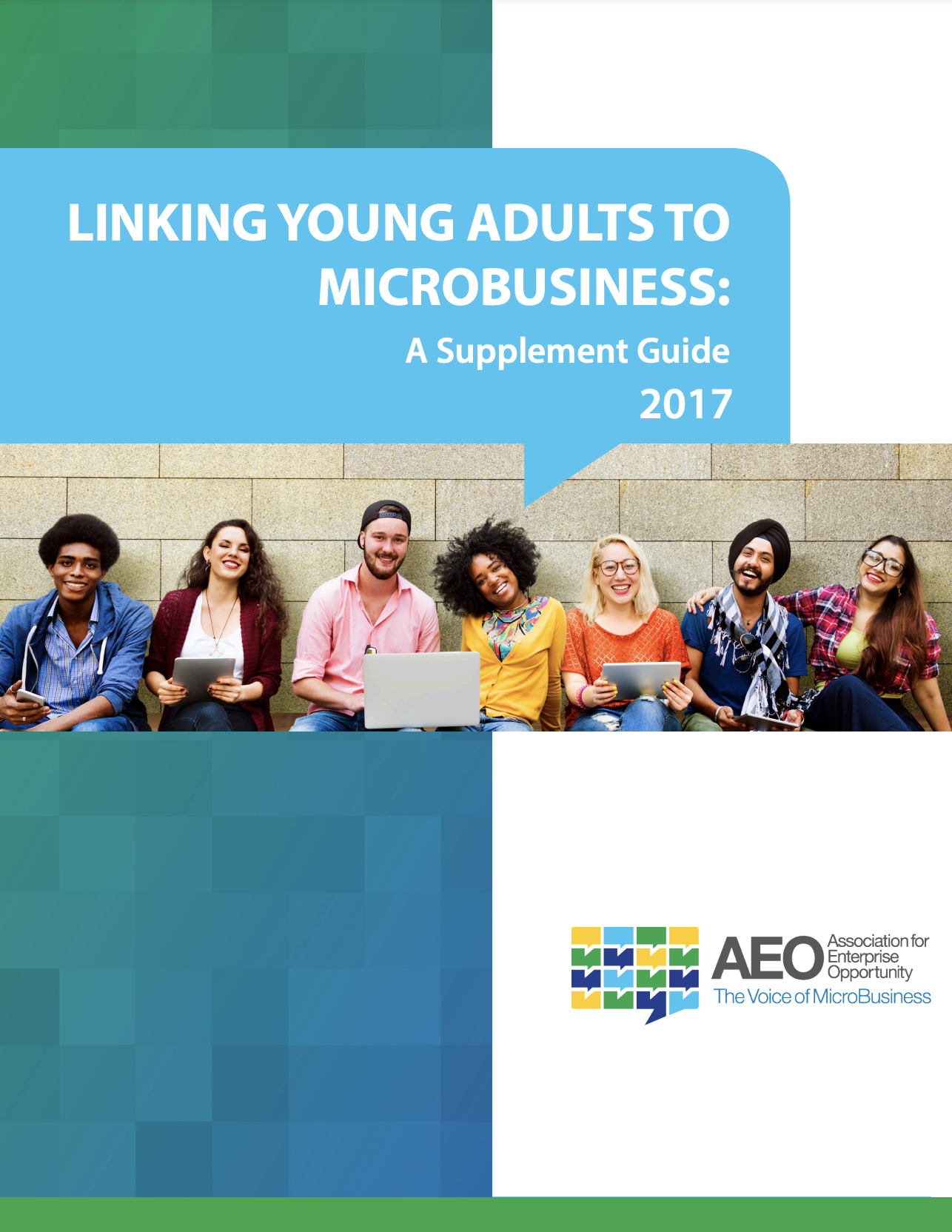
In this follow-up report to Linking Young Adults to Microbusiness, AEO identifies the highest potential opportunities to significantly increase the odds of success for youth (ages 15-24) through an entrepreneurial training strategy.
View publication
Click for more

This report analyzes microbusinesses in Georgia in terms of their number and proportion, their sales and receipts, and their annual payroll by business sector, based on the Survey of Business Owners (SBO) 2007, conducted by the U.S. Bureau of the Census.
View publication
Click for more

AEO, Green America and EcoVentures International (EVI), with support from eBay and the UPS Foundation, conducted a national survey of business owners in order to identify and quantify “green” opportunities for the smallest of businesses, as well as barriers to action.
View publication
Click for more
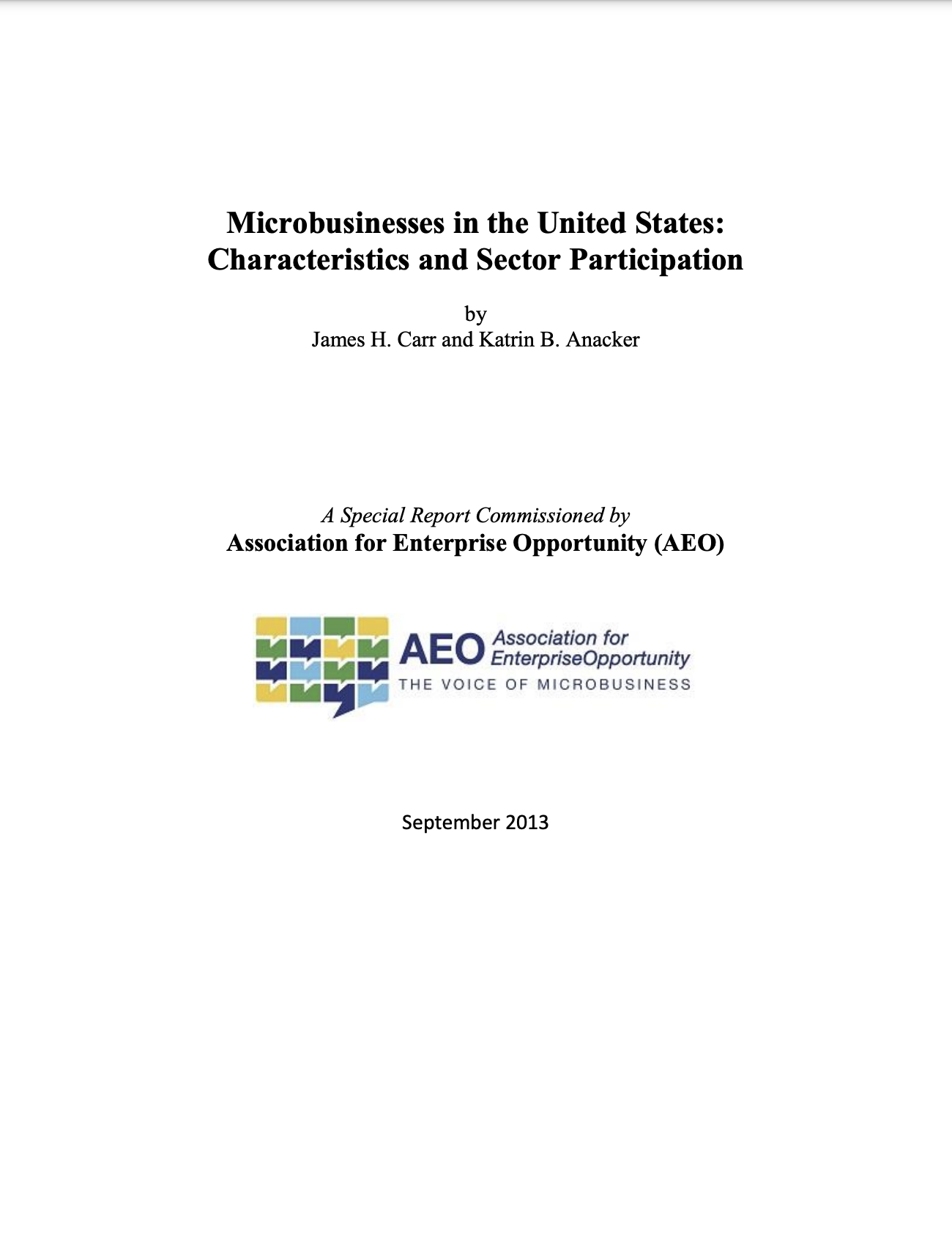
This report provides analyses by business size and sector, gender, race, ethnicity and veteran status, along with detailed insights about microbusinesses. It opens the door to further investigation of the findings within key sectors to better understand how microbusinesses might position themselves to obtain greater business success.
View publication
Click for more
Click for more











































